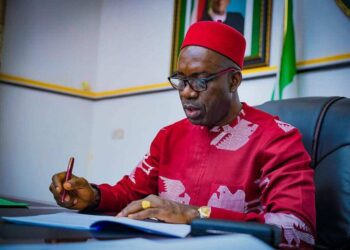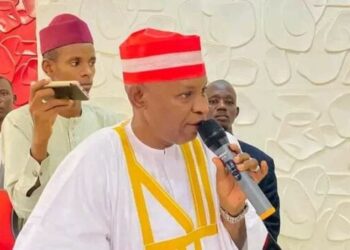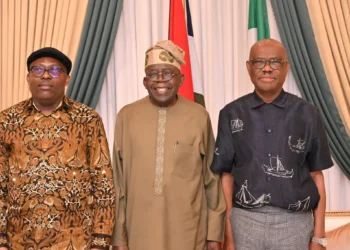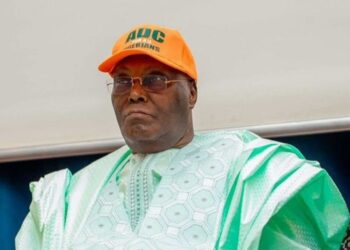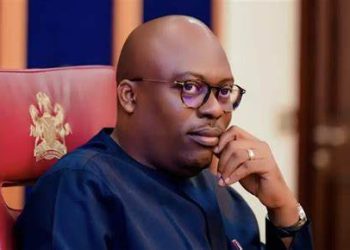The newly constituted National Working Committee of the Peoples Democratic Party, under the chairmanship of Kabiru Tanimu Turaki, has expressed gratitude to Nigerians for their support during Tuesday’s violent confrontation at the party’s national secretariat in Abuja.
In a statement issued by National Publicity Secretary Ini Ememobong, the opposition party described the backing it received from citizens as evidence of “solidarity, courage and resilience” in the face of what it termed tyranny, reinforcing its claim to being “the party of choice” as the 2027 elections approach.
The statement detailed dramatic scenes that unfolded when the new national chairman, accompanied by Governors Bala Mohammed of Bauchi State and Seyi Makinde of Oyo State, attempted to access the party headquarters for the inaugural meeting of the freshly elected executive.
“Nigerians celebrated when the National Chairman, accompanied by the Governors of Bauchi and Oyo States, Sen. Bala Mohammed and Engr. Seyi Makinde, arrived at the National Secretariat for the inaugural meeting of the new executive,” the PDP noted.
However, according to the party’s account, what should have been a routine handover quickly descended into chaos when the leadership team was prevented from entering the building.
The PDP accused “compromised personnel of the Nigeria Police Force” of working in concert with thugs to block access to the secretariat, claiming that these individuals had been “reportedly recruited” by expelled former National Secretary Samuel Anyanwu and “endorsed” by Federal Capital Territory Minister Nyesom Wike, who was also expelled during the party’s Ibadan convention.
“Without any provocation, they fired tear-gas canisters at the Governors, NWC members, party leaders and peaceful supporters,” the party alleged, painting a picture of unprovoked aggression against senior political figures.
The opposition party claimed that over 200 tear gas canisters were discharged at what it described as “unarmed and harmless citizens,” resulting in a stampede and multiple injuries among those gathered at the secretariat.
Despite the hostile reception and the chemical weapons deployed against them, the PDP said its supporters demonstrated remarkable determination, refusing to retreat and insisting that the newly elected leadership be allowed to assume control of the party machinery.
“In the end, they prevailed and the NWC members had access to the National Secretariat,” the statement declared, suggesting that persistence ultimately overcame the resistance.
The party sought to elevate the significance of Tuesday’s confrontation beyond the realm of internal party politics, characterizing it as a pivotal moment for Nigerian democracy itself.
“For the avoidance of doubt, this struggle transcends the PDP. It is about the survival of electoral democracy in Nigeria,” the statement asserted, framing the incident as part of a broader pattern threatening the country’s democratic foundations.
The opposition party directly accused President Bola Tinubu’s administration of facilitating an attack that undermines the principles of multiparty democracy, warning that suppression of opposition voices poses existential dangers to the electoral system.
“When opposition is suppressed, the core democratic principle of institutionalised uncertainty disappears, reducing elections to uneventful events with predetermined outcomes,” the PDP argued, suggesting that a weakened opposition could transform Nigeria’s elections into mere formalities rather than genuine contests.
The party raised concerns about what it termed growing “electoral authoritarianism,” pointing to what it described as systematic weakening of democratic institutions and an “overzealous” posture by the ruling party that threatens to eliminate meaningful political competition.
In an appeal to the international community, the PDP called on “all democracy-loving nations, institutions and individuals” to condemn what it characterized as a “brazen assault on democratic freedom,” seeking external pressure to reinforce domestic resistance to authoritarian tendencies.
The opposition party also directed a message to Nigeria’s security agencies, urging them not to become “tools in the hands of oppressors” by allowing themselves to be used to suppress legitimate political activities.
“They should focus more on combating insurgency, banditry and widespread insecurity instead of facilitating attacks on opposition parties,” the statement said, drawing an implicit contrast between the resources deployed against the PDP and the persistent security challenges affecting ordinary Nigerians.
The party leadership used the statement to reassure supporters and the broader public that it remains committed to defending democratic principles and restoring stability within the opposition movement.
“This NWC reassures Nigerians that the PDP will continue to resist every attempt by anti-democratic agents to derail the party and democracy. Nigeria’s democracy must endure,” the statement concluded, striking a defiant tone despite the violence encountered.
The dramatic confrontation at the PDP secretariat represents the latest chapter in the party’s ongoing internal crisis, which has seen competing factions battle for control following disputed convention proceedings in Ibadan that produced the Turaki-led National Working Committee.
The involvement of serving state governors in Tuesday’s standoff underscores the high stakes involved, as powerful political actors position themselves ahead of the 2027 electoral cycle that will determine control of the presidency and other key positions.
Whether the PDP’s characterization of Tuesday’s events as an assault on democracy gains traction beyond its support base, or is dismissed as dramatization of an internal party dispute, will likely influence how Nigerians perceive both the opposition party and the Tinubu administration’s approach to political competition.
For now, the newly elected PDP leadership appears determined to frame its struggle for control of the party apparatus as inseparable from the larger fight to preserve Nigeria’s democratic system against what it views as creeping authoritarianism.


